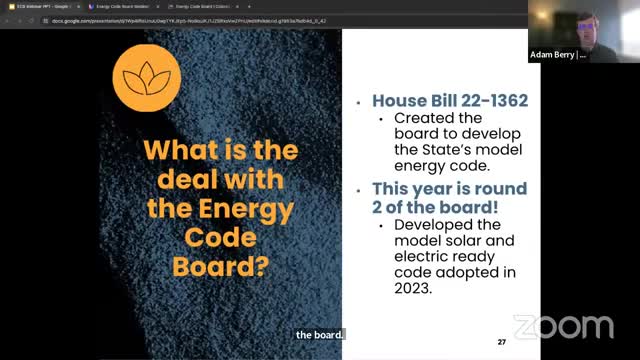Colorado Energy Code Board develops model Low Energy and Carbon Code for building standards
April 27, 2025 | Energy Office, State Agencies, Organizations, Executive, Colorado
Thanks to Scribe from Workplace AI , all articles about Colorado are free for you to enjoy throughout 2025!

This article was created by AI using a video recording of the meeting. It summarizes the key points discussed, but for full details and context, please refer to the video of the full meeting. Link to Full Meeting
During a recent public engagement webinar, board members outlined the importance of this code, which follows the successful adoption of the Model Solar and Electric Ready Code in 2023. This first code focused on ensuring that new buildings are equipped for future electric appliances and electric vehicle (EV) charging, as well as rooftop solar installations. The Low Energy and Carbon Code is set to be implemented by cities and counties across Colorado starting in 2026, making it a critical component of the state's building regulations.
The Energy Code Board consists of 21 representatives from diverse sectors, including affordable housing, energy efficiency, and local government. This broad representation ensures that various perspectives are considered in the code's development, particularly the balance between reducing energy consumption and maintaining housing affordability.
As the board moves forward, it will prioritize reducing carbon emissions while also addressing the challenges of building affordable homes. The outcomes of this initiative are expected to have a lasting impact on Colorado's energy landscape and housing market, setting a precedent for sustainable building practices in the state.
Converted from Energy Code Board Low Energy and Carbon Code - Public Engagement Webinar meeting on April 27, 2025
Link to Full Meeting
Comments
View full meeting
This article is based on a recent meeting—watch the full video and explore the complete transcript for deeper insights into the discussion.
View full meeting